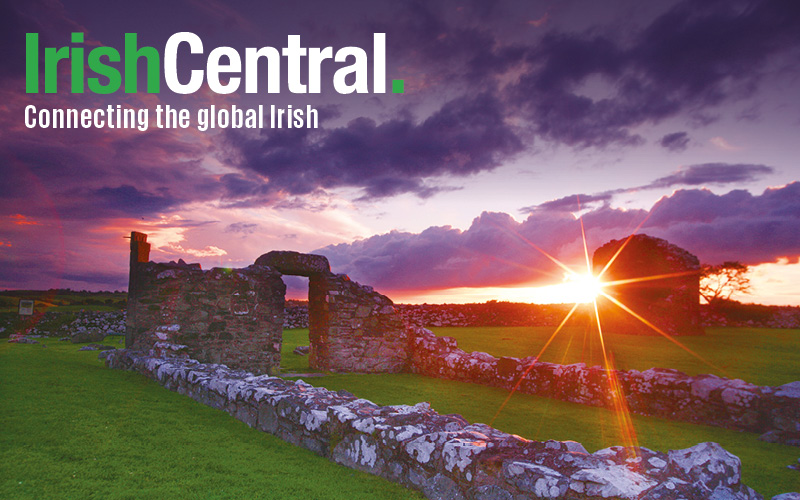The British did not send a diplomat to attend Ireland's otherwise well-attended Famine Memorial in Mayo, because the precedent would have put British diplomacy around the world under enormous pressure. If the British had to face the Irish genocide, they could find themselves being put on the spot of culpability all across the planet.
That's why the British government was not in attendance at Croagh Patrick for the diplomatic event and commemoration ceremony held at the Murrisk Millennium Peace Park in Mayo on Sunday. The United States ambassador to Ireland Dan Rooney was present, as was Australia's ambassador Bruce Davis. Those nations, as Britain might have done for that reason at least, attended in recognition of the Irish role that shaped them as model multicultural states in the "new world." Nations that send immigrants en masse to Ireland today were also present at the Famine ceremony, such as China, Nigeria, Eastern European nations--fourteen nations or so in all--indicating that some of Ireland's depopulation post-Famine, has been repopulated by immigrants from other countries that have much more massive populations in their homelands. Hopefully this is indication that these immigrant populations in Ireland will ascribe to assimilate to the founding principles of the Irish Republic, which places the Irish language as the first official language of the state, in order to reverse the damage Famine did to the Irish speaking populations in the west such as Mayo, where Irish is still spoken, and the memorial ceremony unattended by the British government took place.
The British government never showed up because Irish Famine memorials are just the place to start the precedent of truly dismantling the British Empire, and building up the post-empire world with something reparatory, and not just some new scheme from the IMF or World Bank which have grossly exacerbated post-colonial misery. Had the British attended, they might have been put on the spot by someone like Gaeltacht Minister Pat Carey who officiated the ceremony and is the institutional chief in the state's efforts to restore Irish to a place of esteem in a bi-lingual state, such as was done in Israel and Wales and Catalonia. An Gorta Mór, The Great Hunger would have caused ruination for Irish Gaelic culture, except that the Irish Republic was founded to give the language institutional support as English has long enjoyed, and Irish once enjoyed under native government, in the long and historic nation of Ireland.
DCU's president Prof Ferdinand von Prondzynski is supposed to have claimed, by citing an unnamed UK report, that Ireland's native population could become a minority in Ireland by the year 2050 if trends of migration and birth rates continue in the Republic. In post-Famine Ireland, depopulation has meant that Ireland has a need for new people and more people to make growth. Ironically, native Irish attitudes towards Irish Americans is nearly xenophobic, while discussion on how "new Irish" are expected to participate in the state's founding purpose--to protect the Irish claims to Ireland and reverse the genocidal implications Famine has meant--is almost always PC and discussed in American terms of multi-culturalism, which are entirely inappropriate to a state founded to serve the unique interests of a severely depopulated Irish people. Ireland is not a new world for much more populated countries to send their huddled masses to.
Ireland has always been to a degree, a multi-cultural, multi-ethnic, multi-racial society, but for the bulk of Irish history up to the Famine, that was within a Gaelic millieu, where the "Gall" assimilates into the "Gael," as described by Douglas Hyde and others. As many Irish give up their traditional allegiance to Gaelic culture--after 3,000 years--they are adopting a sort of wishy washy Euro aesthetic for the stronger Anglo-American conception of self called "white" the implications of which would mean Ireland becomes indistinguishable from any English-speaking region in the United States or kingdom. Is this bad? Not necessarily, but it should be discussed openly, as other countries openly limit Irish exodus--the United States recently limited the Irish quota to 1,637 for 2010, meaning that only that many can come from Ireland to replenish the Irish American community here legally--an insultingly tiny number compared to other groups. Less than 2,000 Irish, while 1,129,881 non-nationals from other countries will become legal permanent residents in 2010. This is a reflection that the Irish post-Famine are numerically small, and could be overwhelmed in a democracy by other groups--hence the establishment of their own Republic.
Famine memorial is a good way to begin discussions about Ireland's cultural future. With some of the source nations for the new Irish present, the hope remains in Ireland that the new Irish will become “níos Gaelaí ná na Gaeil iad féin” "more Irish than the Irish themselves." It is at least something to begin talking about. Such discussion of course would take place within the context of discussions about Irish responsibilities to maintain their community-building skills into the future by reconnecting to the long Irish tradition of national dignity and Irish arts, pre-Famine.




Comments